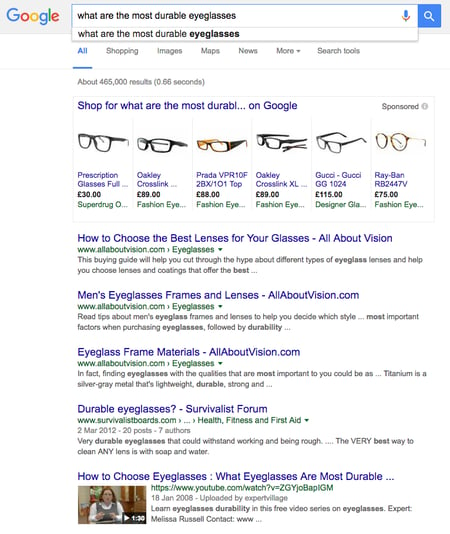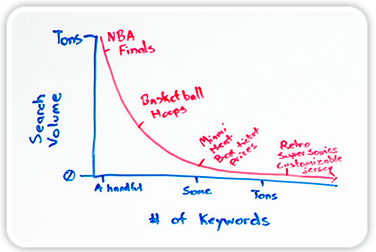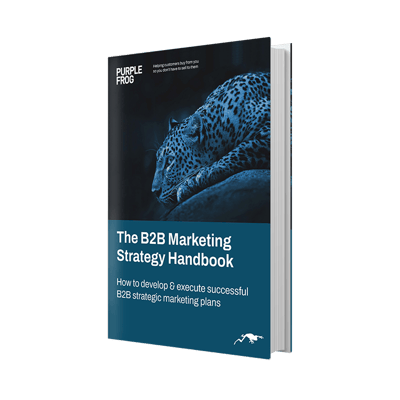How Do You Choose Keywords That Will Give You SEO Success?


“Okay, how do we build up an association between our brand or our domain and the broad keywords, terms, topics, phrases, so that we can rank?"
- Rand Fishkin (moustache legend)
Taken from SEO and moustache legend Rand Fishkin (yes I know it says it above as well), his quote has posed, in slightly more words, the simple question which haunts marketeers and content creators everywhere. What should my keywords be? And, how do I find them?
This is a simple question with a reasonably simple answer to which I will break down into two sections. The problem concerning keywords is one which leads to a host of others including lack of engagement and irrelevant content.
Put in layman-terms a lack of, or poor, keyword focus will essentially lead to your content likely being un-interesting to your target audience. This is something no content creator will want and must look to head off at all costs - hence the need for good keywords to get that SEO success!
Struggling understanding your keywords? Try our FREE SEO Grader to receive you website's score in minutes!
What should my keywords be?
Well who or what is your audience? There is little-to-no point in even beginning this part of on-page SEO without understanding exactly who your current customers are and who your potential customers may be. To determine this you must answer these five basic questions:
1. Who EXACTLY is your customer, what are their demographic groups?
2. What drives them to make purchasing decisions?
3. What media or social platform do they use?
4. What problems do they need answering?
5. How does your idea, service, or product help your target audience?
These are incredibly important as they will underline everything you go on to do. Essentially there is no point producing content on Facebook about the top 5 glasses worn by celebrities, if your audience hangs out on LinkedIn and wants to know about the most durable glasses on the market today! Daft, but you get the point.

Once you have determined who you customers are, you'll quickly be able to establish what language they use and therefore what they are likely to be typing into search engines. From here onwards the ball is really rolling.
From the knowledge you will have now gathered you can determine content which your target audience will find useful, interesting and relevant to the problems that they are facing! This will drive engagement and increase interest in your brand, product or service, and overall company.
In a one-sentence answer: your keywords should be the exact words, phrases and questions that your targeted audience is directly typing into Google (or other SE's)!
How do I find them (keywords)?
There are multiple online tools which can do a lot of your bidding for you. The trick is to strike a balance between search volume and competition.
Naturally there is little point going for words which you are unlikely to rank for. So combined with words that people are actually searching for, this will give you the best possible chance of success. Essentially words with high search volumes and low competition!

Your keyword selection must have a good mix of long and short-tail keywords. We have spoken about this before, here (oh and here!).
As Rand Fishkin notes, "phrases (that) you can uncover there are worth their weight in gold, often driving highly valuable traffic to your site."
By this he is referring to the difficult notion of balancing search volumes with targeted queries. These keywords are referred to as long-tail (four words or more), and will most likely lead you to your most targeted traffic with the trade-off of lower search volumes.
This can become a balancing act but it is important to ensure you are getting your search volumes up whilst maintaining the very specific nature of your keyword focus. Go for search volumes alone and you will likely either not rank at all or end up getting un-targeted, irrelevant traffic to your site which is useful to no-one.
Interestingly - and were we actually disagree with Rand - he says there are two ways to go after long-tail keywords.
1. As above, this involves going for hyper-specific keywords which will get you possibly smaller but far more valuable traffic to your site. Even if this traffic is small, if 50-60% can be converted into leads or customers then it is worth going for these terms.
Rand says: "Conversion-likely, meaning that we know we're going to convert those searchers into buyers if we can get them or searchers into whatever we need them to do."
2. (Here we slightly disagree) Rand notes that going for shorter, more generic keywords will get you that larger traffic. However this approach requires huge amounts of content to cater for your now larger, less focused, audience. This both requires constant fresh content and acceptance that you are likely going to be drawing users into your site who will never likely buy anything. If this a trade off you're willing to make then by all means go for it but remember, more isn't always more.
Rand says: "There are no specific keyword targets available. So, in general, we're focused more on the content itself and less on the specificity of that keyword targeting."
Conclusions
As the staff at Moz rightly state, "Keyword research is one of the most important, valuable, and high return activities in the search marketing field. Ranking for the right keywords can make or break your website."
By understanding what your keywords are, you will understand what your target audience is and what they want. You will be able to understand industry trends so as to tailor your content, products, service or even company to these terms.
The importance in understanding what you customers are typing into Google when they search your site cannot be overstated. "By researching your market's keyword demand, you can not only learn which terms and phrases to target with SEO, but also learn more about your customers as a whole."
The main takeaway from this should simply be: quality over quantity. You are not looking to target everyone here, you are looking for the people who will actually buy your product or use your service.
More from Website Visibility

How to grow your business also when you are on holiday this Christmas
Growing your business whilst you are stuffing yourself with food and spending time with your loved ones seems more of a dream...
6 Questions You Should Ask Yourself Before Starting Inbound Marketing
Inbound is the buzz-word of the marketing world right now. It has been the most effective digital marketing strategy in the US...






